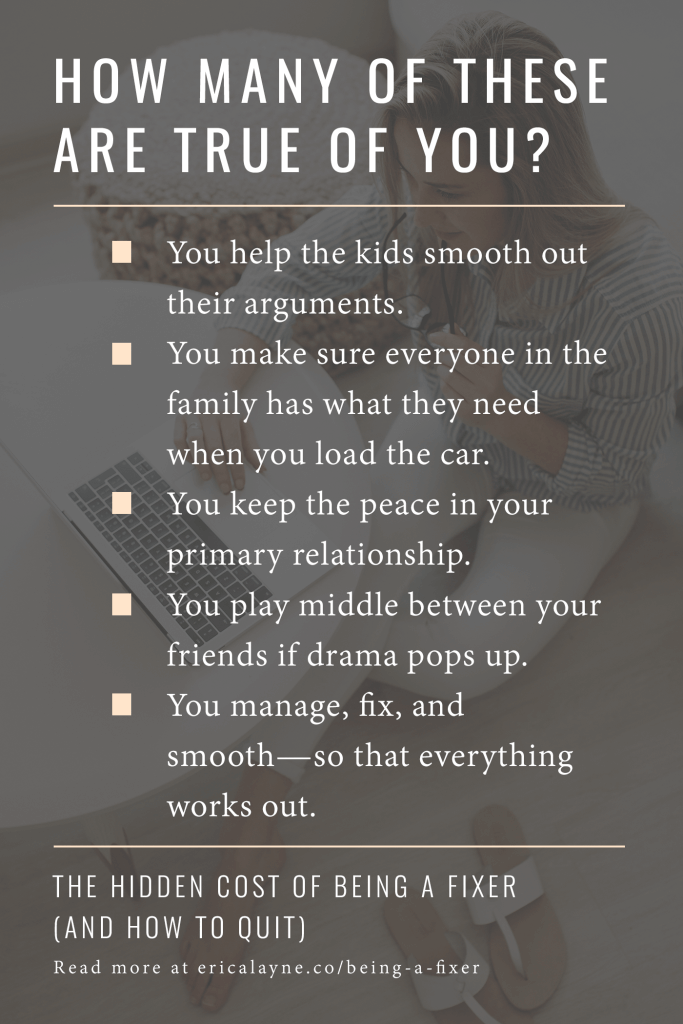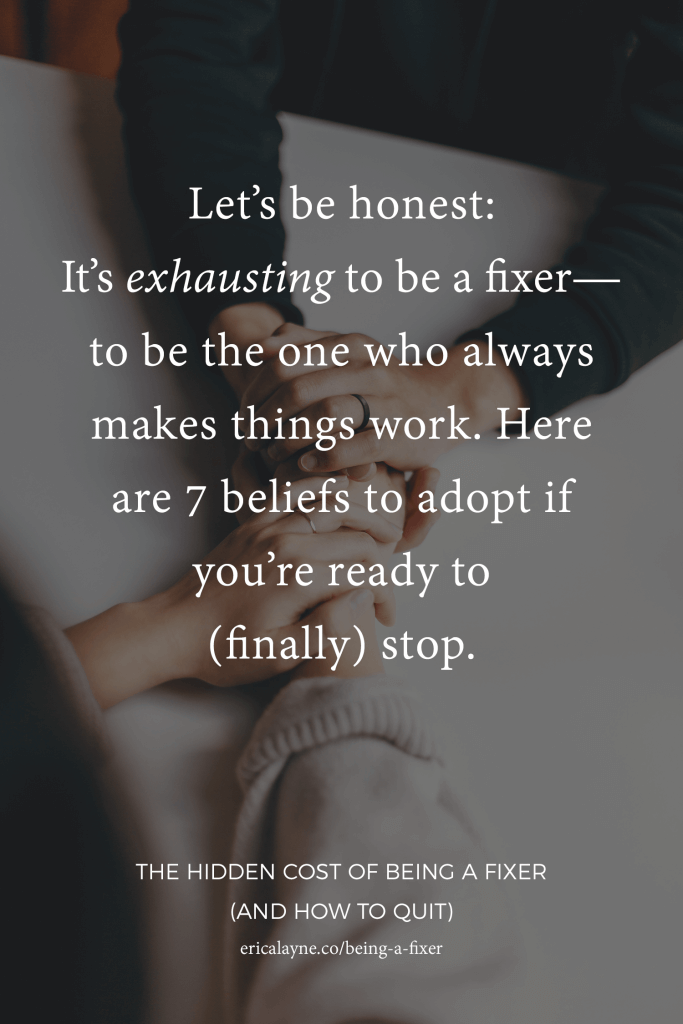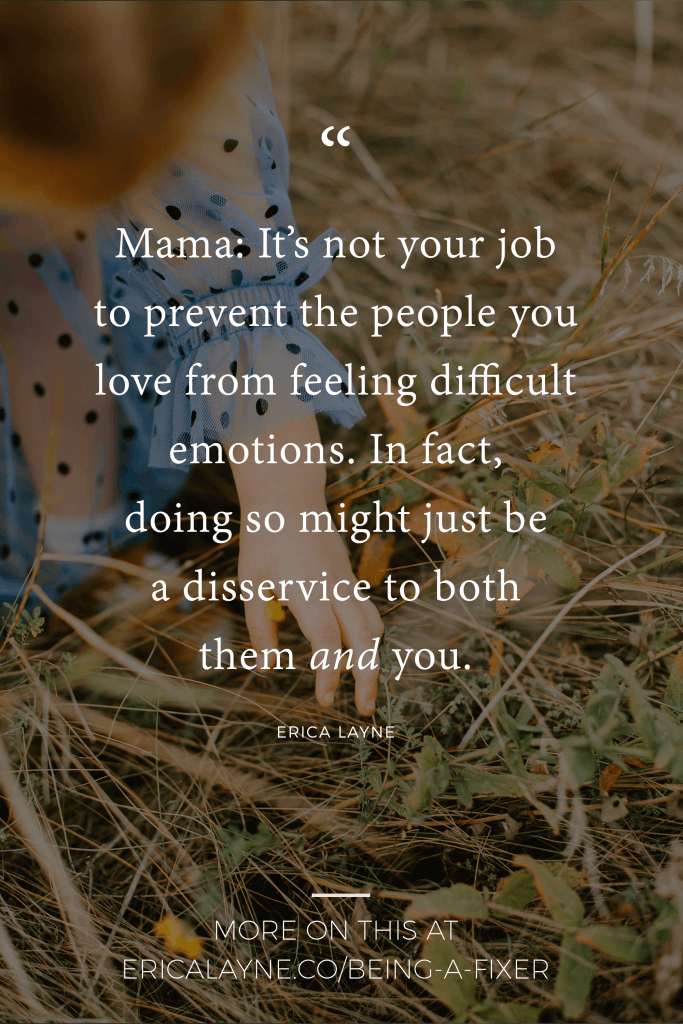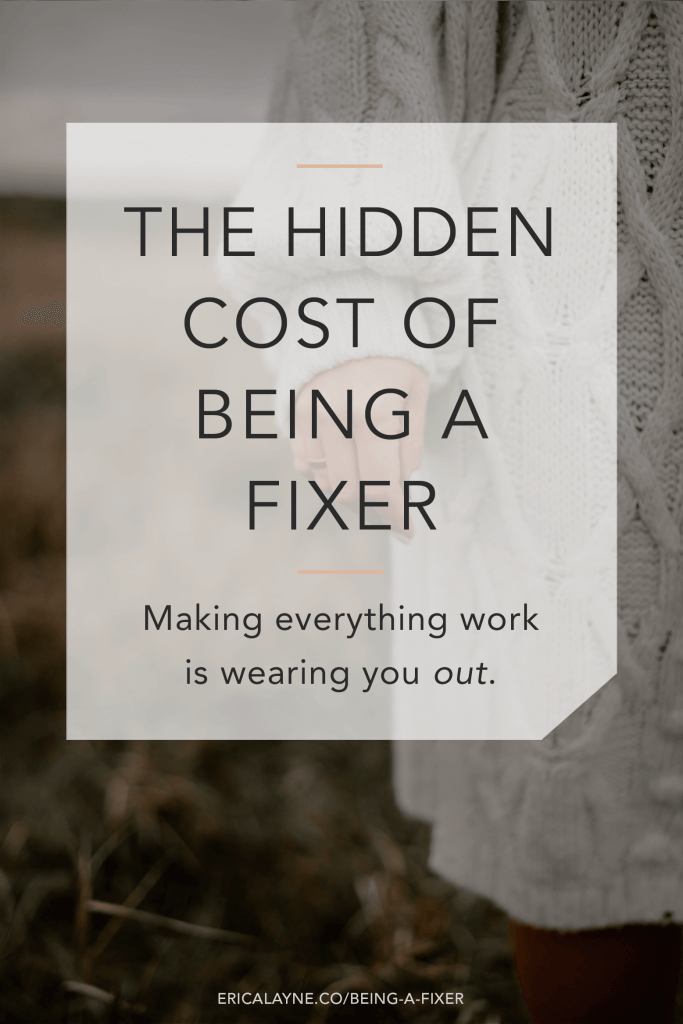I see you. Yes, you.
The one who sniffs out the first sign of discord and smoothes it over before anyone else has even noticed.
The one who stretches herself into a hundred shapes to make sure no one feels left out, hurt, sad, or unsupported.
The one who quietly believes that if she can just do her very best, everyone and everything will be okay.
You’re a fixer.
I get it, because I’m a fixer too.
I help the kids smooth out their arguments.
I make sure everyone in the family has what they need when we’re loading the car.
I keep the peace in my marriage.
I play middle between my friends if any drama pops up.
I manage, fix, smooth, and manipulate—all with the best of intentions.
If you’re like me, you’ve played this role for most of your life, and you get some good things from it—mainly the comfort of making everything work out.

The Cost of Being a Fixer
But let’s just acknowledge it: It’s exhausting to be a fixer.
Fixing and smoothing may make things easier for you and others in the short term, but the long-term cost is heavy. Exhaustion, resentment, anger.
I see this a LOT in my 1:1 coaching—women who have given so much to make things work that they have very little left. They’re constantly tired, feel weighed down by resentment, and are quicker to get angry than they ever remember being.
Through coaching burned-out women and observing my own fixer tendencies, I’ve crystalized seven beliefs that will help fixers everywhere put down the torch.
If you can open yourself up to these beliefs, you will gradually feel a thousand times lighter.

7 Beliefs to Adopt If You Want to Stop Being a Fixer
1. The thing you’re trying so hard to prevent is simply difficult emotion.
The next time you find yourself jumping in to fix something, ask yourself, “What am I trying to prevent or avoid?” Ninety-nine percent of the time, it’s not the outcome that you can’t tolerate; it’s how you’ll feel about that outcome. You’re trying to keep your loved one and yourself from experiencing emotion.
2. We gain emotional confidence BY experiencing the full spectrum of emotions.
Imagine if you had unequivocal faith in yourself to process any difficult emotion (humiliation, shame, grief, etc.). How invincible would that make you?
3. In preventing the people we love from experiencing difficult feelings, we actually deprive them of chances to build emotional confidence.
Do you want to be the person keeping someone else from experiencing what they need to experience?

4. When you allow yourself and others to feel difficult feelings, you empower yourself and others.
You’re basically telling the people you love, “There is no feeling that you cannot process and survive.” What an incredible vote of confidence.
5. Your work is to get more comfortable with discomfort—both your own AND others’.
If you can hold space for discomfort, you no longer have to bend until you break.
6. Recognizing and continually reminding yourself of the COST of fixing will help you let go.
It’s so tiring to carry the responsibility for everyone around you. Let. it. gooooo.
7. You will never be your most authentic self if you continue shape-shifting for others.
All of the fixing, smoothing, pleasing, and appeasing not only wears you down; it also keeps you from becoming your truest self.

You Will Be Okay
Being a fixer stems from a deeply rooted place of fear—the fear that you won’t be able to handle it if things in your life go wrong. It’s the fear you won’t be okay.
I believe that building a deep, endlessly refilling reservoir of self-love is the key to being okay.
Sure, you can continue bending over backwards to figure things out and make them work.
OR…
You can love yourself so freaking much that no matter how things work out, you know without a doubt that you will be okay.
So here’s my nudge:
Trade all of that trying—your mountains of effort—for more investment in yourself. It isn’t selfish; it will spill over in all the best ways.
And then no matter what, you will be OKAY.

More from Episode 37 of “Life On Purpose with Erica Layne”
Here’s what else you can hear in the latest episode of the podcast!
- Self-Care Spotlight: A segment where I remind you not to neglect the person you spend all of your time with—you! Are you that person who KNOWS she needs to take better care of herself but just never manages to? Today’s super simple, yet incredibly impactful tip is for you!
- What Matters Most: A segment to help us take our eyes off the nonessentials and refocus on the essentials! In this episode I offer 3 things to remember today—especially if you are a giver. ❤️
Listen to the full episode in your favorite podcast app, or in the audio player below! And be sure to hit follow!
Apple Podcasts | Google Podcasts | Spotify | Overcast | Stitcher
Show produced by Astronomic Audio
xo!






Boy, did this really strike a chord with me. Although I’m not sure if I’m 100% in this category. My problem is that my husband and I entertain his family for Thanksgiving, Christmas, and Easter, and occasional family parties in the summer. We’ve been doing this for more than 20 years. And I’m beyond exhausted. I am all the things you said — resentful, angry, tired — and I feel used. It is to the point where I no longer look forward to these holidays and get very depressed because of what is “expected” of me to “perform” for them. I will be completely transparent here: we have done this our way primarily because his family members aren’t capable for a variety of reasons, but mostly laziness. I expressed my honest feelings to him this summer and tried to compromise, but he would have none of it. He said if we don’t “do it all,” then we’re not doing any of it. Doing it all is as follows: he prepares the meat for dinner, I do the rest. Shopping, cleaning the house, prepping for overnighters to boot, decorating, place setting nametags, invitations and coordinating who is bringing what for the “after party,” in addition to cooking all the side dishes for dinner. (The after party is a few hours after dinner is over and we pull out desserts and simple noshing items like chips/dip, charcuterie, etc. These people are at our house from 1 to around 9-10 p.m.) My compromise offer was that we have everyone come for dinner at 4 p.m., clean up, have dessert, and they go home by 8, but they also have to bring a side dish for dinner. We will provide the turkey, gravy, and stuffing, they do the rest. We had a huge fight and he will not “make” his family do this, so we are not doing anything. At all. And, it’s only his family. Mine are nearby, but we never have room for them because his family is pretty big. The holidays are the prime problem, but there are other things that crop up, like his family wants us to plan, cook, and host at our house a birthday party when their mother turns 90 in a few years. “Because you guys are so good at it,” they say. I’ve reached the end of my rope and at this point I don’t really care what they say or the opinion they have of me for not wanting to do this anymore. I end up spending way too much time making sure they’re having a good time, and I feel like I’m just the hired caterer.